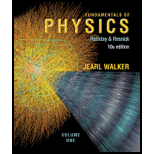
Concept explainers
In Fig. 13-24, two particles, of masses m and 2m, are fixed in place on an axis, (a) Where on the axis can a third particle of mass be placed (other than at infinity) so that the net gravitational force on it from the first two particles is zero: to the left of the first two particles, to their right, between them but closer to the more massive particle, or between them but closer to the less massive particle? (b) Does the answer change if the third particle has, instead, a mass of 16m? (c) Is there a point off the axis (other than infinity) at on the third particle would be zero?
Want to see the full answer?
Check out a sample textbook solution
Chapter 13 Solutions
Fundamentals of Physics, Volume 1, Chapter 1-20
Additional Science Textbook Solutions
College Physics: A Strategic Approach (3rd Edition)
Conceptual Physical Science (6th Edition)
Tutorials in Introductory Physics
University Physics with Modern Physics (14th Edition)
Physics for Scientists and Engineers: A Strategic Approach with Modern Physics (4th Edition)
Conceptual Physics: The High School Physics Program
- Problem 3: A particle with mass m,=2 kg is located at x=0 while a particle with mass m,=128 kg is located at x=200 m along the x axis. Somewhere between them is a point where the gravitational force of m, acting on a mass m,_1 kg is canceled by the gravitational force of m, acting on that mass. (a) What is the coordinate x of this point? (b) Find the ratio (in terms of integer numbers) of the magnitude of the net gravitational force on a mass m, 1 located at (x=100, y=0) relative to the magnitude of the net gravitational force on the same mass m, when located at (х-300, у-0) 1kgarrow_forwardTwo identical particles of each mass M are located on the x-axis at x =+ a and at x - a. Write down an expression for the net gravitational pull F on a unit (a) mass (m-1), placed on the y-axis, due to these two particles as a function of y and a. Discuss the variation of this gravitational pull on the unit mass as it move along the y axis from - to tx. (b) (c) At what point (or points) on the y-axis, is the magnitude of the net gravitational pull F a maximum?arrow_forward(c) Two uniform stars are separated by 2.36 × 1016 m. The star on the left has a mass of 5.33 × 1028 kg and the star on the right has a mass of 2.76 × 1030 kg. Determine the magnitude of the gravitational force on the star on the right. (d)Consider the two stars from part (c) above. Let the dotted line joining their centers be on the x-axis with the origin at the center of the star on the left. Determine the location of the center of mass of the two-star system.arrow_forward
- Two particles of equal mass (m) move in a circle of radius (r) under the action of their mutual gravitational attraction. The speed of each particle is GM (a) 2r GM (b) 4r Mr (c) V 2G 4r (d) V GMarrow_forwardWhat must the separation be between a 5.2 kg particle and a 2.4 kg particle for their gravitational attraction to have a magnitude of 2.3 * 10-12 N?arrow_forward(a) Evaluate the gravitational potential energy between two 5.00-kg spherical steel balls separated by a center-to-center distance of 15.0 cm. (b) Assuming that they are both initially at rest relative to each other in deep space, use conservation of energy to find how fast will they be traveling upon impact. Each sphere has a radius of 5.10 cm.arrow_forward
- The density of a sphere is giving by p(r)=C/r. The sphere has a radius of 5.0 m and a mass of 1.0*10^11kg. (a) Determine the constant C (b) Obtain expressions for the gravitational field for the regions (1) r > 5.0m, and (2) r<5.0m.arrow_forwardTwo spherical bodies of masses M and 5M and radii R and 2R are released in free space with initial separation between their centres equal to 12 R. If they attract each other due to gravitational force only, then the distance covered by the smaller body before collision is [CBSE AIPMT 2015] (a) 2.5 R (c) 7.5 R (b) 4.5 R (d) 1.5 Rarrow_forwardA particle of mass 3m is located 1.00 m from a particle of mass m. Where should you put a third mass M so that the net gravitational force on M due to the two masses is exactly zero?arrow_forward
- (a) Evaluate the gravitational potential energy (in J) between two 6.00 kg spherical steel balls separated by a center-to-center distance of 19.0 cm. (b) Assuming that they are both initially at rest relative to each other in deep space, use conservation of energy to find how fast (in m/s) will they each be traveling upon impact. Each sphere has a radius of 5.20 cm. m/sarrow_forwardAn object of mass m is launched from a planet of mass M and radius R. a)Derive and enter an expression for the minimum launch speed needed for the object to escape gravity, i.e. to be able to just reach r = ∞. b)Calculate this minimum launch speed (called the escape speed), in meters per second, for a planet of mass M = 6 × 1023 kg and R = 76 × 104 km.arrow_forwardWhat must the separation be between a 4.7 kg particle and a 6.6 kg particle for their gravitational attraction to have a magnitude of 7.3 × 10-12 N?arrow_forward
 Principles of Physics: A Calculus-Based TextPhysicsISBN:9781133104261Author:Raymond A. Serway, John W. JewettPublisher:Cengage Learning
Principles of Physics: A Calculus-Based TextPhysicsISBN:9781133104261Author:Raymond A. Serway, John W. JewettPublisher:Cengage Learning Classical Dynamics of Particles and SystemsPhysicsISBN:9780534408961Author:Stephen T. Thornton, Jerry B. MarionPublisher:Cengage Learning
Classical Dynamics of Particles and SystemsPhysicsISBN:9780534408961Author:Stephen T. Thornton, Jerry B. MarionPublisher:Cengage Learning

